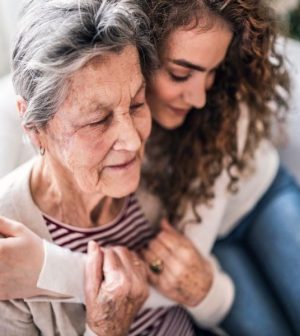- Recognizing the Signs of Hypothyroidism
- 10 Strategies to Overcome Insomnia
- Could Artificial Sweeteners Be Aging the Brain Faster?
- Techniques for Soothing Your Nervous System
- Does the Water in Your House Smell Funny? Here’s Why
- Can a Daily Dose of Apple Cider Vinegar Actually Aid Weight Loss?
- 6 Health Beverages That Can Actually Spike Your Blood Sugar
- Treatment Options for Social Anxiety Disorder
- Understanding the Connection Between Anxiety and Depression
- How Daily Prunes Can Influence Cholesterol and Inflammation
Lots of Teens, Young Adults Are Helping to Care for Older Loved Ones

(HealthDay News) – Many people regard middle-aged caregivers as the “sandwich generation” — folks caring for young kids as well their aging moms, dads or grandparents.
It turns out that’s not the whole picture, according to a new study, which found that 14- to 24-year-olds may be providing care much more often than expected.
“We generally talk about caregiving in terms of being an adult responsibility. But we found that emerging adults are responsible for taking care of an adult relative in a more intensive capacity much more often than we had thought,” said study leader Minakshi Raj, a professor of kinesiology and community health at the University of Illinois Urbana-Champaign. “Understanding their situations and needs can be useful as we develop policies and practices to help these emerging adults.”
In a survey of 1,076 young people, 35% reported they had previously provided care for older relatives or were currently doing so.
Those numbers were 10 times higher than previous estimates, which have been based on studies of specific diseases or tasks.
Participants were asked three open-ended questions about whether they had acted as a caregiver for an adult relative; how caregiving impacts educational or career goals; and what kinds of resources would be most helpful for caregivers. These questions captured many caregivers that had not been represented in prior studies, according to researchers.
Participants said what would help them most would be training in specific skills, such as giving medications or changing bandages; more information about their relative’s specific condition; financial resources to help offset caregiving expenses; and social and emotional support.
About 72% said caregiving had or would negatively affect their career or educational goals, but some also described rewarding aspects of caregiving, Raj said. About 9% said they would provide the care no matter the personal costs.
Researchers will analyze and catalogue other details from the responses, including whether young adults are providing short-or long-term care and whether it is part-time or full-time. They will also see whether they are providing care independently or helping as part of a family or group effort.
“A big takeaway for health care providers from this study is that it’s really important to talk to young adults and figure out what their caregiving experiences are, and there are two reasons for that,” Raj said. “First, to point them to resources so that they can learn how to be a caregiver, if that’s something that they need. Second, to be able to intervene early if there are impacts of caregiving on mental or physical health.”
She noted that these respondents are at a young age to shoulder the responsibility and personal demands of caregiving and also the emotion of watching a loved one struggle or decline.
The findings were recently published in the Journal of Adolescent Health.
More information
USA.gov has more information on caregiver support.
SOURCE: University of Illinois Urbana-Champaign, news release, April 12, 2021
Source: HealthDay
Copyright © 2026 HealthDay. All rights reserved.










